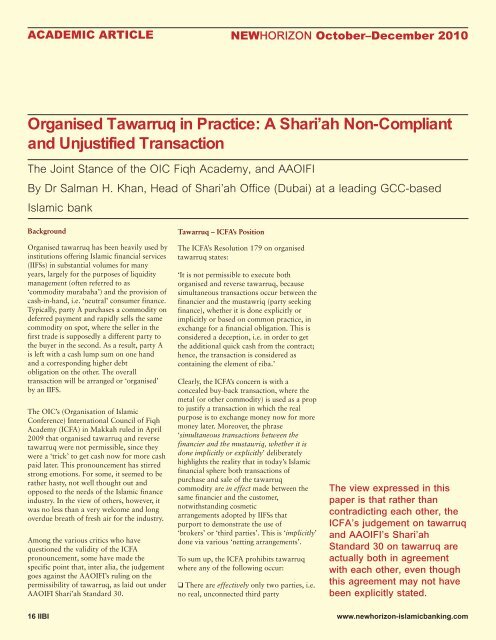NEWHORIZON
NEWHORIZON - Institute of Islamic Banking and Insurance
NEWHORIZON - Institute of Islamic Banking and Insurance
- No tags were found...
You also want an ePaper? Increase the reach of your titles
YUMPU automatically turns print PDFs into web optimized ePapers that Google loves.
ACADEMIC ARTICLE<br />
<strong>NEWHORIZON</strong> October–December 2010<br />
Organised Tawarruq in Practice: A Shari’ah Non-Compliant<br />
and Unjustified Transaction<br />
The Joint Stance of the OIC Fiqh Academy, and AAOIFI<br />
By Dr Salman H. Khan, Head of Shari’ah Office (Dubai) at a leading GCC-based<br />
Islamic bank<br />
Background<br />
Organised tawarruq has been heavily used by<br />
institutions offering Islamic financial services<br />
(IIFSs) in substantial volumes for many<br />
years, largely for the purposes of liquidity<br />
management (often referred to as<br />
‘commodity murabaha’) and the provision of<br />
cash-in-hand, i.e. ‘neutral’ consumer finance.<br />
Typically, party A purchases a commodity on<br />
deferred payment and rapidly sells the same<br />
commodity on spot, where the seller in the<br />
first trade is supposedly a different party to<br />
the buyer in the second. As a result, party A<br />
is left with a cash lump sum on one hand<br />
and a corresponding higher debt<br />
obligation on the other. The overall<br />
transaction will be arranged or ‘organised’<br />
by an IIFS.<br />
The OIC’s (Organisation of Islamic<br />
Conference) International Council of Fiqh<br />
Academy (ICFA) in Makkah ruled in April<br />
2009 that organised tawarruq and reverse<br />
tawarruq were not permissible, since they<br />
were a ‘trick’ to get cash now for more cash<br />
paid later. This pronouncement has stirred<br />
strong emotions. For some, it seemed to be<br />
rather hasty, not well thought out and<br />
opposed to the needs of the Islamic finance<br />
industry. In the view of others, however, it<br />
was no less than a very welcome and long<br />
overdue breath of fresh air for the industry.<br />
Among the various critics who have<br />
questioned the validity of the ICFA<br />
pronouncement, some have made the<br />
specific point that, inter alia, the judgement<br />
goes against the AAOIFI’s ruling on the<br />
permissibility of tawarruq, as laid out under<br />
AAOIFI Shari’ah Standard 30.<br />
Tawarruq – ICFA’s Position<br />
The ICFA’s Resolution 179 on organised<br />
tawarruq states:<br />
‘It is not permissible to execute both<br />
organised and reverse tawarruq, because<br />
simultaneous transactions occur between the<br />
financier and the mustawriq (party seeking<br />
finance), whether it is done explicitly or<br />
implicitly or based on common practice, in<br />
exchange for a financial obligation. This is<br />
considered a deception, i.e. in order to get<br />
the additional quick cash from the contract;<br />
hence, the transaction is considered as<br />
containing the element of riba.’<br />
Clearly, the ICFA’s concern is with a<br />
concealed buy-back transaction, where the<br />
metal (or other commodity) is used as a prop<br />
to justify a transaction in which the real<br />
purpose is to exchange money now for more<br />
money later. Moreover, the phrase<br />
‘simultaneous transactions between the<br />
financier and the mustawriq, whether it is<br />
done implicitly or explicitly’ deliberately<br />
highlights the reality that in today’s Islamic<br />
financial sphere both transactions of<br />
purchase and sale of the tawarruq<br />
commodity are in effect made between the<br />
same financier and the customer,<br />
notwithstanding cosmetic<br />
arrangements adopted by IIFSs that<br />
purport to demonstrate the use of<br />
‘brokers’ or ‘third parties’. This is ‘implicitly’<br />
done via various ‘netting arrangements’.<br />
To sum up, the ICFA prohibits tawarruq<br />
where any of the following occur:<br />
❑ There are effectively only two parties, i.e.<br />
no real, unconnected third party<br />
The view expressed in this<br />
paper is that rather than<br />
contradicting each other, the<br />
ICFA’s judgement on tawarruq<br />
and AAOIFI’s Shari’ah<br />
Standard 30 on tawarruq are<br />
actually both in agreement<br />
with each other, even though<br />
this agreement may not have<br />
been explicitly stated.<br />
16 IIBI www.newhorizon-islamicbanking.com
















